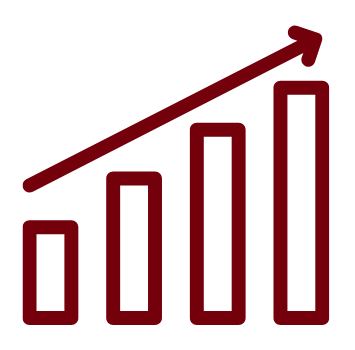B.S. in Data Science

Want more info?
To learn more about the data-related degrees at the University of South Carolina,
contact Brian Habing, Program Director.
The data science major prepares you to work with data at both theoretical and practical levels. With a foundation in mathematics, statistics and computer science, the degree helps you build skills to model complex problems and conduct research to find solutions.
Studying data science is ideal for students considering graduate school and whose interests span programming, mathematics and statistics. Students prepare for careers ranging from research to technical fields, industry and government.
B.S. in Data Analytics
The data analytics major helps you apply data science and statistical methods to any field you’re passionate about, in areas involving data: physical sciences, social sciences, digital humanities, sport and entertainment management, marketing, health care and more.
Combining the core data courses with a required minor or a second major in an area of your interest, the data analytics degree gives you skills in collecting and analyzing data to inform sound decisions. You’ll be prepared for data analysis positions and for data-centered graduate programs in your area of specialization.
More degrees for data careers
The majors in statistics, mathematics and computer science at the University of South Carolina also offer robust pathways to data-centered careers, with different areas of focus. Check out these majors to explore more options.

Employment of data scientists is projected to grow 35 percent from 2022 to 2032.
The median annual wage for data scientists was $103,500 in May 2022. (bls.gov)
Data skills are in demand
Jobs in data science are growing at one of the fastest rates in the United States, with an expected increase of 35% by 2032. You can customize our data degrees to prepare for careers including:
- Data Analyst
- Data Scientist
- Data Visualization Developer
- Bioinformatics Technician
- Marketing Research Analyst
- Operations Research Analyst
- Social Science Research Analyst

Strength from multiple departments
Both the data science and data analytics degrees are interdisciplinary — they let you work with top-notch faculty in mathematics, statistics and computer science, along with other disciplines from across the university, as you earn your degree. A well-rounded education gives you a head start on your career goals or graduate study.
The Curriculum
The shared core of the data analytics and data science degrees focuses on data analysis.
You’ll learn:
- data science and machine/statistical learning methods for applied problems.
- data management and programming skills to prepare data and carry out various methods.
- writing and data visualization skills to present findings to a target audience.
- data ethics to ensure analysis is conducted appropriately.
Data analytics specific courses are aimed at applying data science and statistical/machine learning methods to a specific area of application. This is done by selecting a minor or second major in that area and is complemented by electives chosen from departments across campus.
The required data analytics math sequence gives students the background to keep up with new methodological developments in the future.
Appropriately chosen courses can prepare the data analytics students for a data-focused graduate program in the area of their minor or second major.
Program Requirements and a major map for the Data Analytics B.S. can be found in the Academic Bulletin.
Data science specific courses develop and refine new methods for data science and statistical/machine learning. For mathematics, the degree includes calculus, upper division courses in linear algebra, discrete structures and an advanced course in theory.
The major electives include advanced methods and theory courses in mathematics, statistics and computer science.
Appropriately chosen courses can allow students to minor or double major in mathematics, statistics, computer science or an area of application and prepare students for graduate study in data science or any of one of those fields.
Program Requirements and a major map for the Data Science B.S. can be found in the Academic Bulletin.
